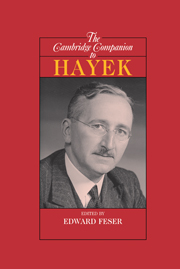Book contents
- Frontmatter
- Introduction
- 1 Hayek and the Austrian tradition
- 2 Hayek on money and the business cycle
- 3 Hayek and market socialism
- 4 Hayek and Marx
- 5 Hayek versus Keynes: the road to reconciliation
- 6 Hayek on knowledge, economics, and society
- 7 Hayek and Popper: the road to serfdom and the open society
- 8 Hayek’s politics
- 9 Hayek the philosopher of law
- 10 Hayek and liberalism
- 11 Hayek and conservatism
- 12 Hayek on the evolution of society and mind
- 13 Hayek on justice and the order of actions
- 14 Hayek the cognitive scientist and philosopher of mind
- Guide to Further reading
- Bibliography
- Index
6 - Hayek on knowledge, economics, and society
Published online by Cambridge University Press: 28 January 2007
- Frontmatter
- Introduction
- 1 Hayek and the Austrian tradition
- 2 Hayek on money and the business cycle
- 3 Hayek and market socialism
- 4 Hayek and Marx
- 5 Hayek versus Keynes: the road to reconciliation
- 6 Hayek on knowledge, economics, and society
- 7 Hayek and Popper: the road to serfdom and the open society
- 8 Hayek’s politics
- 9 Hayek the philosopher of law
- 10 Hayek and liberalism
- 11 Hayek and conservatism
- 12 Hayek on the evolution of society and mind
- 13 Hayek on justice and the order of actions
- 14 Hayek the cognitive scientist and philosopher of mind
- Guide to Further reading
- Bibliography
- Index
Summary
Hayek's theory of knowledge is his most distinctive contribution both to economics and to social science. Its foundation is “our irremediable ignorance” (Hayek 1982a, p. 13), both as social actors and as social theorists. “The dispersion and imperfection of all knowledge are two of the basic facts from which the social sciences have to start” (Hayek 1952a, p. 50). The knowledge which members of modern societies possess is necessarily imperfect and incomplete, and can never be perfected. This is so for several reasons which are all interlinked; first, because in any modern society knowledge is fragmented and dispersed among millions of individuals; second, because the limits of human reason mean that many things remain unknown and unknowable to individual members of society whether in their roles as social actors or social theorists; and third, because the unintended consequences of human action and the tacit nature of so much of the knowledge that individuals do possess means that modern societies have to be understood as organisms evolving through time, representing extremely complex phenomena which defy the normal methods of science either to explain or to control.
- Type
- Chapter
- Information
- The Cambridge Companion to Hayek , pp. 111 - 131Publisher: Cambridge University PressPrint publication year: 2006
- 7
- Cited by



